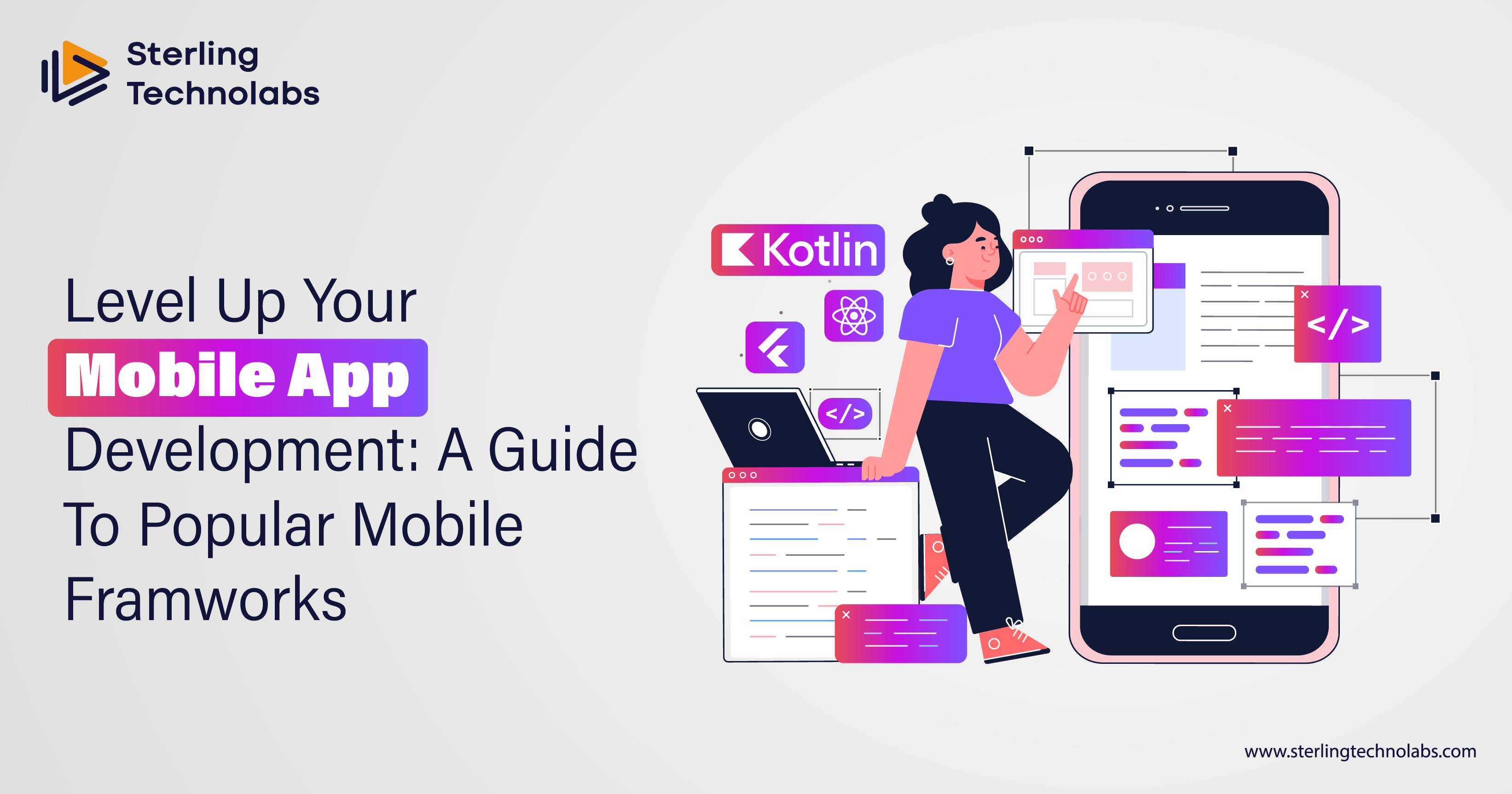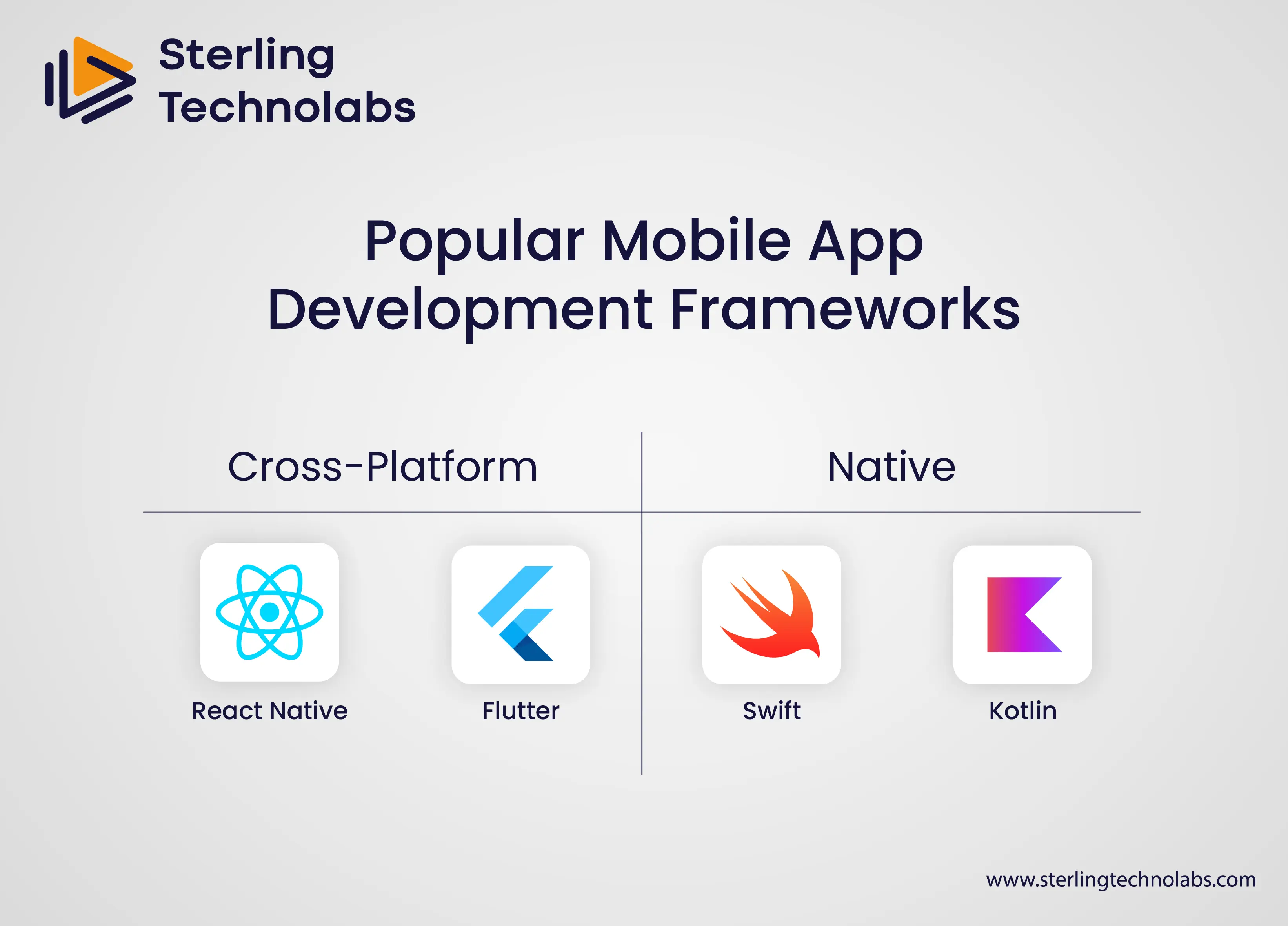
Mobile app development frameworks are a set of tools or pre-written code that is used by app developers to streamline the entire app creation process. It provides them with a kind of foundation or structure that not only saves their time and efforts but resources as well.
Categories of Frameworks
Cross-platform frameworks
These frameworks allow app developers to create an application using a single codebase that can be run on multiple platforms like Android or iOS. In other words, app developers don’t have to learn multiple languages for different-different platforms.
Native Frameworks
These are completely different from that of cross-platform which means these are specific to a particular platform. For example, Kotlin works only on Android, not on iOS.
Popular Mobile App Development Frameworks - Cross-Platform

React Native
React native is a popular javascript library that is used for building user interfaces, using React and Javascript. It allows developers with web development knowledge to leverage their skills for mobile app development as it relies on web technologies for the mobile app development process.
Key Features
Since it utilises Javascript, a language familiar to web developers, the development cycle is faster here.
React Native is a cross-platform framework therefore app developers have to write code only for once and then it can be run on both iOS and Android, thus saving time and cost.
The changes in the react native code are reflected in the app instantly thus allowing app developers for a quicker iteration and bug fixes.
Flutter
Flutter is another popular cross-platform framework developed by Google. It offers a very unique development approach since it doesn't rely on web technologies like react native, instead uses its own rendering engine and widget toolkit.
Key Features
It uses Dart programming language which is a modern object-oriented language specifically designed for user interfaces. It is generally considered to be developer-friendly.
UIs can be built here with customizable widgets that provide a more native look and feel on each platform.
Similar to react native, the changes in Flutter code are also reflected in the app instantly.
Popular Mobile App Development Frameworks - Native
Swift (iOS Development)
Swift is a programming language that was introduced by Apply for creating iOS apps. It offers clean syntax, improved safety features and seamless integration with Apple's development tools and libraries.
Key Features
The language has been designed while keeping modern programming concepts in mind thus prioritising code readability, maintainability and security.
It leverages the full capabilities of Apple’s software and hardware components, thus providing optimal app performance and a seamless user experience.
Since it is Apple’s official language, the developer community is vast and a wealth of resources are available.
Kotlin (Android Development)
Kotlin is a programming language that was developed by JetBrains but then officially adopted by Google for Android development. It is a modern and expressive language that is designed to be interoperable with Java.
Key Features
It grants full access to the Android SDK and platform features using which developers can leverage the full potential of Android devices.
It priorities code safety by eliminating some of the loopholes of Java, thus resulting in fewer bugs and more robust applications.
The code of Kotlin is cleaner and more concise as compared to that of Java, resulting in better code readability and maintainability.
How to Choose the Right Frameworks For Mobile App Development?
The following are the factors that you should consider before choosing the right framework for your mobile app development:
Complexity
Consider the complexity of your app’s features and functionalities. If your app is simpler then go for cross-platform frameworks otherwise native frameworks might be a better choice.
Platform
Decide whether you want your mobile application to be available on iOS, Android or both. If you want to reach both audiences with a single code base then cross-platform frameworks are ideal otherwise native frameworks also offer the best possible experience on each platform individually.
Performance
When it comes to performance, native frameworks hold an upper hand but cross-platform frameworks like Flutter are also catching up lately. Therefore, there is a slight difference between them!
Conclusion
This is not the complete list, just some of the popular mobile app development frameworks. There is a chance you might be familiar with some of these languages but not the one you want to proceed with. But no issues, as Sterling Technolabs - A Centre of Cutting Edge Software Development Capabilities is here! Whatever framework you choose, we will get you delivered!
Our team consists of highly skilled professionals with expertise in various technologies such as Web Development, Mobile App Development, AI Development, Machine learning, Blockchain, DevOps and more. We are committed to delivering top-notch services to our clients and ensuring their satisfaction with our solutions. So do check us out.


No comments:
Post a Comment